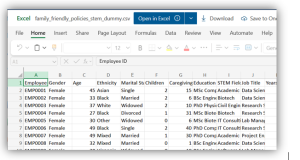In an exciting development for gender equity and workforce innovation, researchers at the Centre of intelligence of Things, University of Greater Manchester, United Kingdom have unveiled a comprehensive new dataset aimed at cracking one of STEM’s toughest challenges which is, retaining women in science, technology, engineering, and mathematics careers.
The dataset, generated from simulated real-world scenarios, dives deep into the impact of family-friendly policies on women’s career longevity in STEM fields. It includes a rich mix of data on flexible work hours, remote work options, childcare support, parental leave, and the availability of return-to-work programs. all were mapped against key indicators like job satisfaction, work-life balance, and actual retention status.
This dataset explores what policies truly move the needle in supporting women to stay and thrive in STEM, So it’s not just about predicting retention, it’s about giving organizations the data-backed insights they need to make meaningful changes.
Using machine learning models, researchers are now predicting which policies are most effective, and early results show that flexible hours and onsite childcare support are among the strongest factors influencing retention.
As calls for diversity and equity in STEM grow louder, this dataset offers a valuable springboard for policy innovation, workforce planning, and academic research, putting the power of data to work in shaping a more inclusive future.
